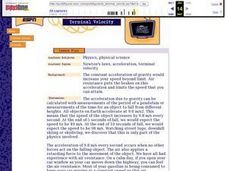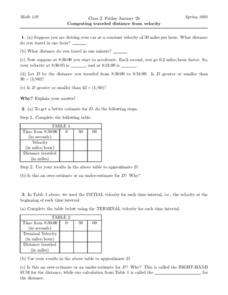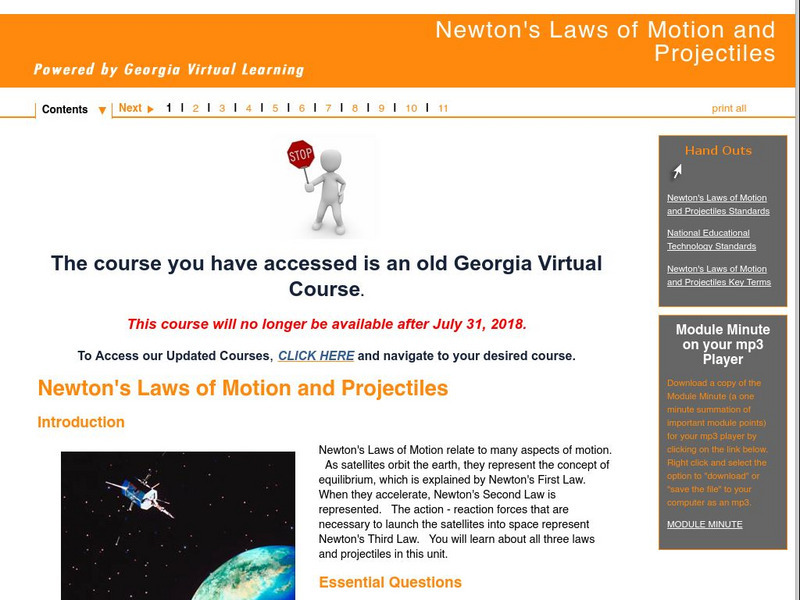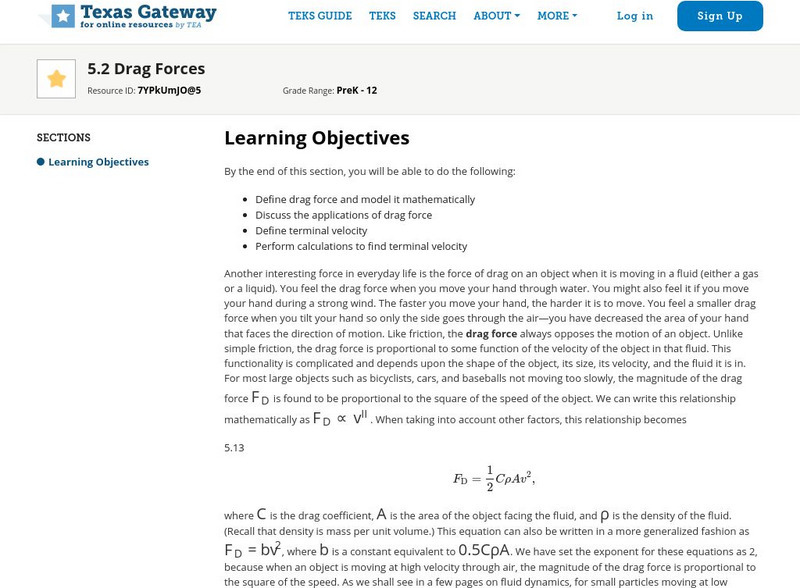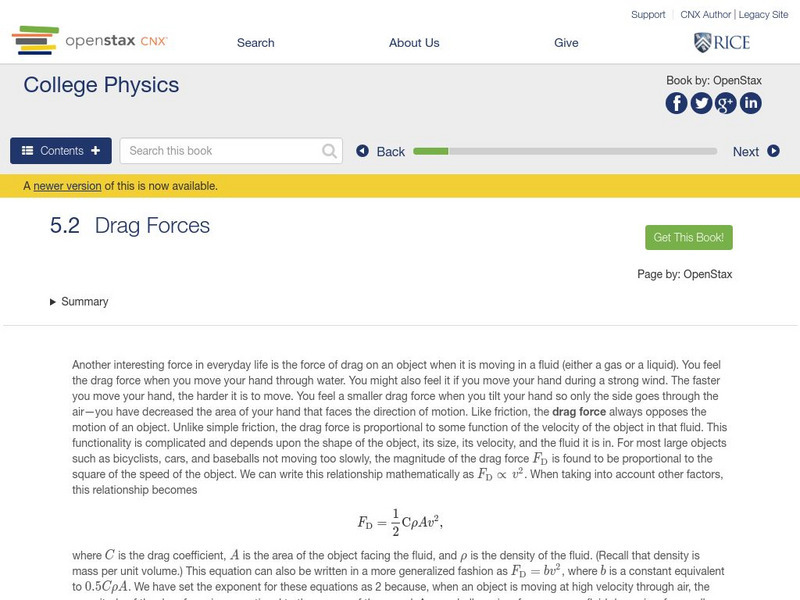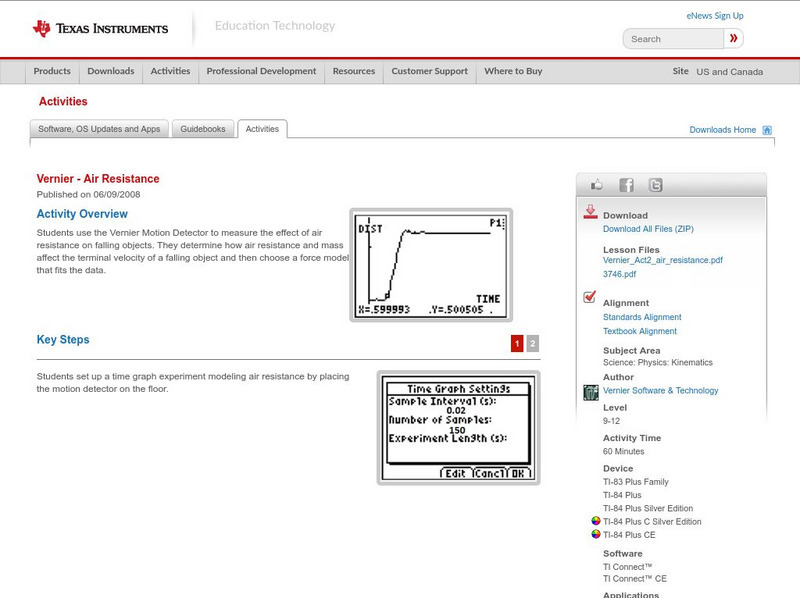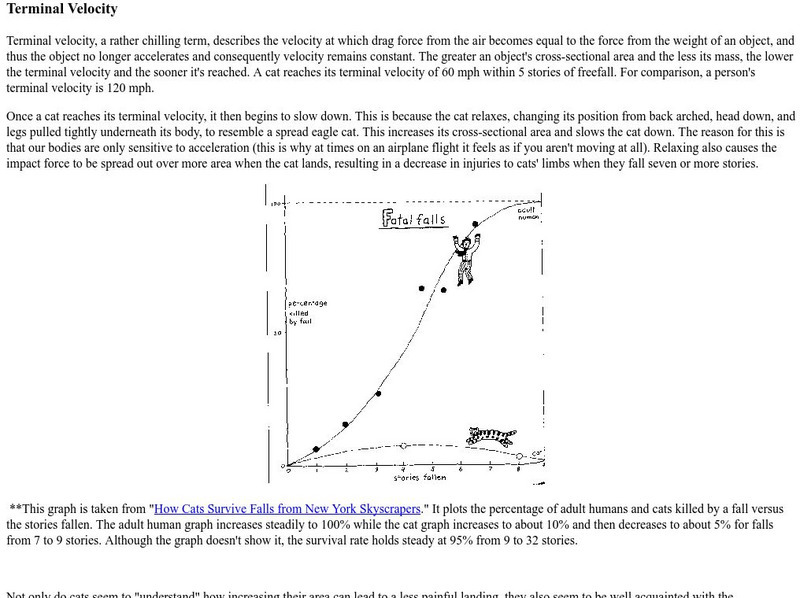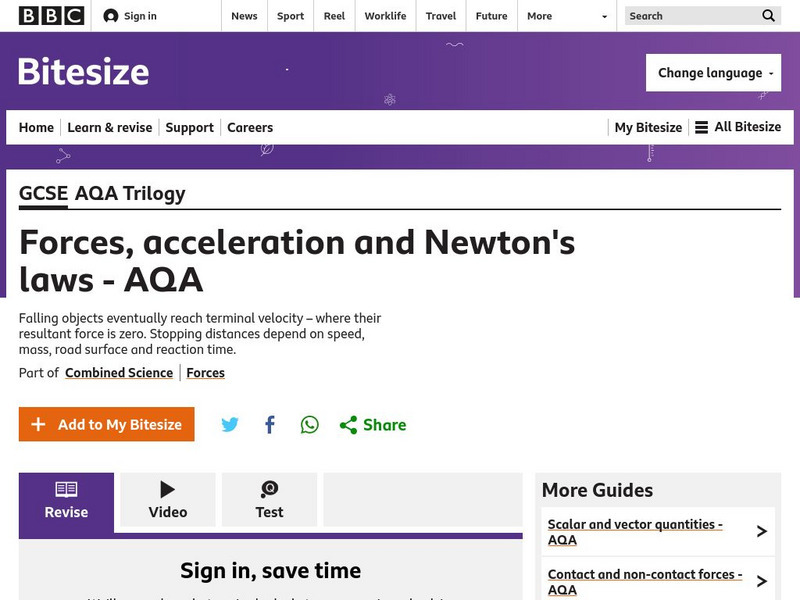Curated OER
Terminal Velocity
Students calculate acceleration due to gravity with the measurements of the period of a pendulum or measurements of the time for an object to fall from different heights. They observe and measure the effect of air resistance on the...
CK-12 Foundation
Cliff Diver
Cliff diving is more than an adrenaline rush ... it's a lesson in physics! Scholars adjust the height of a cliff and plot the resulting velocity and position over time on graphs. They also can incorporate air resistance to monitor the...
Urbana School District
Forces
Is your class struggling with Newton's Second Law? Then show them a presentation that covers everything physics scholars need to know about forces. Starting with gravity, the slides focus on Newton's Laws of Motion, and end with an...
Teach Engineering
Measuring Viscosity
Groups use a marble to determine the viscosity of household fluids. The procedure calls for pupils to measure the amount of time it takes a marble to fall a specified distance in the fluids. Using unit conversions and algebra, the teams...
Teach Engineering
Egg-cellent Landing
The classic egg-drop experiment gets a new bounce with an activity that asks pairs to design a lander similar to one used to land a rover on Mars within a fixed budget. The activity provides a great introduction to the idea of...
Curated OER
Newton's Second Law
In this Newton's law of motion activity, students review the concepts and equation associated with Newton's second law of motion. Students complete 7 matching and 5 true or false questions.
Curated OER
Motion Near Earth
In this motion worksheet, students will match 5 physics vocabulary words relating to motion with their definitions. Then, they will review 9 statements of different motion scenarios to determine is the statement is true or false....
Curated OER
Computing Traveled Distance from Velocity
In this velocity instructional activity, students compute the distance they would travel given a constant velocity for a car for specified amounts of time. They use tables to find the initial and terminal velocities for each time interval.
Curated OER
Gravity Study Guide
In this gravity worksheet, students define terms such as free fall, terminal velocity, and inertia. Then students compare the different types of forces that act upon objects. This worksheet has 9 short answer and 4 fill in the blank...
Georgia Department of Education
Ga Virtual Learning: Newton's Laws of Motion and Projectiles
Through informational text, interactive activities, practice problems, online labs, virtual simulations, and video clips, students learn about Newton's Laws of Motion.
University of Colorado
University of Colorado: Ph Et Interactive Simulations: The Moving Man, Motion, Velocity, Acceleration, Position
Enhance study of motion, velocity, acceleration, position and graphing with this interactive simulation.
Physics Classroom
The Physics Classroom: Elephant and Feather: Air Resistance
The concept of air resistance is discussed in terms of why a heavier object falls faster than a lighter object when both dropped from the same height. In this discussion and animation, an elephant and feather are used as examples.
Texas Education Agency
Texas Gateway: 5.2 Further Applications of Newton's Laws: Drag Forces
By the end of this section, you will be able to define drag force and model it mathematically, discuss the applications of drag force, define terminal velocity, and perform calculations to find terminal velocity.
OpenStax
Open Stax: College Physics: Drag Forces
In the following tutorial, students will learn how to express mathematically the drag force and also discuss its applications. They will also define terminal velocity and determine the terminal velocity given mass.
Texas Instruments
Texas Instruments: Air Resistance
Students use the Motion Detector to measure the effect of air resistance on falling objects. They determine how air resistance and mass affect the terminal velocity of a falling object and then choose a force model that fits the data.
Other
St. Chris Physics: The Physics of Skydiving
This illustration provides an overview of the scientific process of when a skydiver steps out of a plane.
Other
University of Alaska: Terminal Velocity
University of Alaska physics professor site explaining the concept of terminal velocity. Uses the terminal velocities of humans and cats for comparison. Site contains an interesting graph of the percent fatalities versus stories fallen.
National Geographic
National Geographic: Terminal Velocity
Researchers compare the terminal velocity of humans to peregrine falcons in hopes to increase top speeds in human extreme skydiving.
TeachEngineering
Teach Engineering: Egg Cellent Landing
The purpose of this activity is to recreate the classic egg-drop experiment with an analogy to the Mars rover landing. The concept of terminal velocity will be introduced, and students will perform several velocity calculations. Also,...
Physics Classroom
The Physics Classroom: Free Fall and Air Resistance
This lesson in high school physics on Newton's Second Law of Motion provides a discussion of free fall and air resistance, and answers, "Why do objects which encounter air resistance ultimately reach a terminal velocity?" and "In...
BBC
Bbc: Gcse Bitesize: Newton's Laws
This lesson focuses on Newton's Law for falling objects including terminal velocity, the three stages of falling, a diagram showing what happens to the speed of a skydiver from airplane to ground, velocity-time graphs for falling...
BBC
Bbc: Gcse Bitesize: Forces, Acceleration and Newton's Laws Aqa
This lesson focuses on Newton's First Law: an object remains in the same state of motion unless a resultant force acts on it. If the resultant force on an object is zero, this means: a stationary object stays stationary; a moving object...
NASA
Nasa: Beginner's Guide to Aerodynamics
Includes exhaustive information and a wealth of activities pertaining to aerodynamics and the physics of flight.
Khan Academy
Khan Academy: Velocity and Acceleration Vectors
This 11-problem quiz/practice helps students to understand how velocity and acceleration can be represented using vectors.


